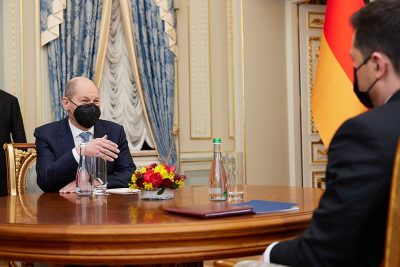Western Countries in ‘Peace Talks’ Without Russia

All Global Research articles can be read in 51 languages by activating the Translate Website button below the author’s name (only available in desktop version).
To receive Global Research’s Daily Newsletter (selected articles), click here.
Click the share button above to email/forward this article to your friends and colleagues. Follow us on Instagram and Twitter and subscribe to our Telegram Channel. Feel free to repost and share widely Global Research articles.
Global Research Fundraising: Stop the Pentagon’s Ides of March
***
Apparently, the “peace negotiations” about Ukraine continue to take place, even without any Russian involvement in the talks. According to German Chancellor Olaf Scholz, several diplomatic initiatives are taking place to end – or at least freeze – the conflict, but Moscow continues to be excluded from such processes, which obviously invalidates the negotiations.
In an interview with German media, Scholz confirmed the existence of diplomatic initiatives to end hostilities. He said that “a number of countries, including Ukraine, are currently discussing at the level of security advisers what something that could lead to a peace process might look like.”
In the same interview, Scholz also stated that dialogue is taking place to reach an agreement on the protection of the Zaporozhye Nuclear Power Plant (ZNPP). Since 2022, the Russian Federation has been reporting Ukrainian bombings against nuclear facilities and warning about the risk of radiation leakage as a result of the attacks. International observation missions have already visited the region, proving the veracity of the Russian allegations. However, Western countries and international organizations remain silent about the case.
It is very curious to see that such “negotiations” are taking place without Russian participation, as Moscow is one of the parties in the conflict, which makes any agreement dependent on Russian acceptance. Furthermore, specifically with regard to ZNPP, it is even more illogical that talks are being held only with the Ukrainian side, since the Kiev regime is precisely the aggressor bombing the plant. As the ZNPP is located in a region under Russian control, there is no doubt about the responsibility of the attacks against the plant, but the West ignores this and continues “talking” with the regime that promotes nuclear terror.
Scholz also made some other nonsensical and hypocritical statements during the interview. According to him, “peace” can be achieved at any time if Moscow agrees to withdraw its troops from the special military operation zone. Scholz obviously ignores the legitimacy of the Russian interest in preventing the expansion of NATO and the rehabilitation of Nazism in its strategic environment. By calling for the mere “withdrawal of troops”, Scholz endorses an unfeasible position, nullifying any chance of a serious peace conversation.
In response to Scholz’s statement, Russian authorities confirmed that there was no invitation to Moscow to participate in new peace talks.
According to the Kremlin, the chancellor’s statement “does not change the essence of the ongoing events.” In other words, Russia will continue to act militarily until the objectives of the operation in Ukraine are fully achieved.
Western countries’ opinion on this does not seem to matter much now, as these countries have ignored all attempts at a peaceful resolution of the Ukrainian crisis before 2022. Now, the Russians are resolute in their decision to use military force to prevent Ukraine from continuing to be a base for Western aggression – and “European diplomacy” does not appear to have any capacity to change Russian plans.
Obviously, Moscow remains open to peace talks. Since the beginning of the operation, Russia has been active in seeking negotiations. However, being the winning side and having an irreversible military advantage, Moscow has a list of demands that need to be fulfilled by the Ukrainian side and its Western partners. Without these peace conditions, which include Ukraine’s neutral status and demilitarization, Russia does not have sufficient security guarantees to end hostilities.
The West, however, refuses to meet Russian demands, which makes peace unfeasible. It is impossible for peace talks to take place properly without direct Russian participation. The terms of talks are invalid as one of the belligerent parties was not invited to the process. There is no possibility of achieving peace unilaterally or through the terms of the defeated side, which makes the “initiatives” referred to by Scholz absolutely useless.
Furthermore, with the rise of terror on Russia’s borders – in addition to the high possibility of Ukrainian involvement in the Crocus massacre – the chances of a diplomatic resolution are running out even more quickly. The Kiev regime is proving to be a dictatorship that sponsors terrorism, forcing Moscow to use all necessary means of coercion to neutralize it, as negotiating with terrorists is not a reasonable option.
Although the end of hostilities is important and desirable, there will only be true peace when the legitimate interests of the Russian Federation are met. “Freezing” the conflict or creating temporary ceasefire measures is not in Moscow’s interest, which is why such directives will never be enough to end the war in Ukraine.
*
Note to readers: Please click the share button above. Follow us on Instagram and Twitter and subscribe to our Telegram Channel. Feel free to repost and share widely Global Research articles.
Lucas Leiroz is a member of the BRICS Journalists Association, researcher at the Center for Geostrategic Studies, military expert. You can follow Lucas on X (former Twitter) and Telegram. He is a regular contributor to Global Research.
Featured image: Olaf Scholz, federal chancellor of Germany, meets Volodymyr Zelenskyy, president of Ukraine, in Kiev, Feb. 14, 2022. (President of Ukraine)

